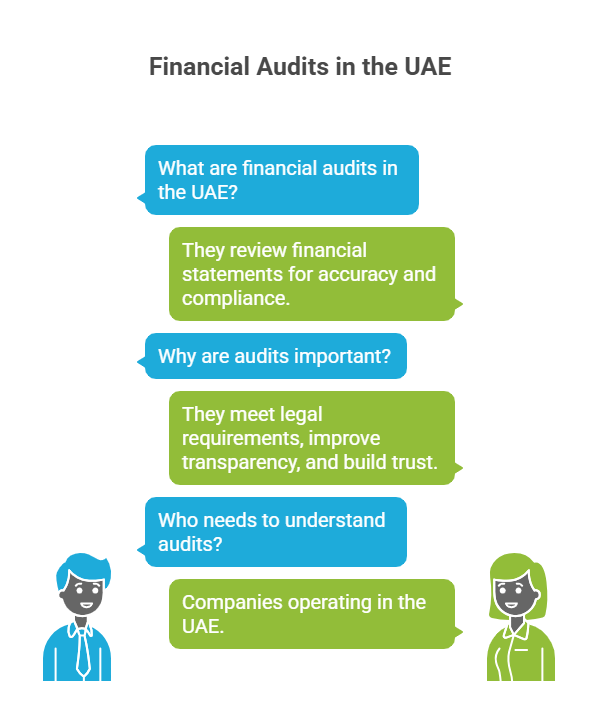
Introduction to Financial Audits in the UAE
Financial audits are a key requirement for many businesses in the UAE.
They involve reviewing financial statements to confirm accuracy and compliance with accounting standards.
Audits not only meet legal requirements but also improve transparency and build trust with investors, regulators, and partners. For companies operating in the UAE, understanding when and why audits are required is essential.
Definition of financial audit
A financial audit is an independent examination of a company’s financial records. The goal is to provide assurance that statements are accurate and free from material misstatements.
Importance of audits for UAE businesses
Audits give stakeholders confidence that a company’s finances are reliable. They help attract investors, secure loans, and meet compliance obligations under UAE law.
Legal Framework for Financial Audits in the UAE
UAE Commercial Companies Law requirements
Under the UAE Commercial Companies Law, Limited Liability Companies (LLCs) and Joint Stock Companies must prepare audited financial statements annually.
Free zones and audit obligations
Most free zones, such as DMCC, JAFZA, and DIFC, require companies to submit audited reports. While requirements vary by zone, audits are generally mandatory for license renewals.
Types of Financial Audits in the UAE
Internal vs external audits
- Internal audit: Conducted by in-house or outsourced teams to assess processes and risks.
- External audit: Performed by independent auditors for compliance and reporting purposes.
Statutory audits
These are mandatory audits required by law for certain companies, ensuring financial statements align with regulations.
Special purpose audits
Conducted for specific needs, such as mergers, acquisitions, or forensic investigations.
Who Needs a Financial Audit in the UAE?
LLCs and joint stock companies
By law, all LLCs and Joint Stock Companies in the UAE must undergo annual audits.
Free zone companies
Most free zones require companies to submit audited accounts to maintain trade licenses. Rules differ by zone, so businesses must check specific regulations.
SMEs and startups
While not all SMEs are legally required to audit, many choose to do so for investor confidence and to access financing.
The Financial Audit Process Explained
Planning and preparation
Auditors meet with management, understand the business, and plan the audit scope. Companies must provide financial records and supporting documents.
Examination of records
Auditors review bank statements, invoices, contracts, and accounting systems. They test samples to verify accuracy and compliance with accounting standards.
Reporting and auditor’s opinion
At the end, auditors issue a report with their opinion. This may be unqualified (clean), qualified, or adverse, depending on findings.
Benefits of Conducting Financial Audits
Ensuring compliance
Audits confirm businesses follow UAE laws and free zone regulations, reducing the risk of penalties.
Building investor and stakeholder trust
Audited statements improve credibility, making it easier to attract investors and secure loans.
Detecting errors and fraud
Audits help identify misstatements, errors, or fraudulent activities, protecting business integrity.
Choosing the Right Audit Firm in the UAE
Qualities to look for in an auditor
- Registered with UAE authorities.
- Strong industry experience.
- Transparent pricing.
- Good reputation and client references.
Questions to ask before hiring
- Are you licensed to operate in the UAE?
- Do you have experience with my industry?
- How do you ensure compliance with UAE laws?
- What support do you provide after the audit?
Conclusion
Financial audits are a legal requirement for many UAE businesses and a smart choice for those seeking transparency and credibility.
Whether mandated by law or chosen voluntarily, audits ensure compliance, build investor trust, and safeguard against errors and fraud.


